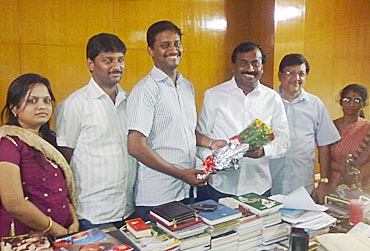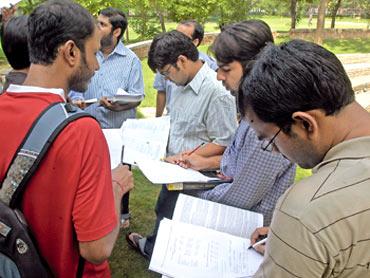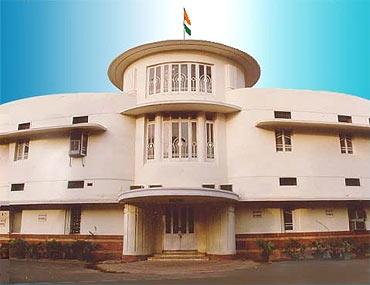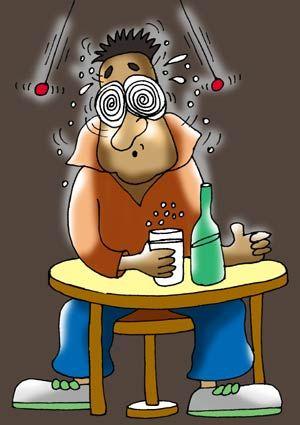 | « Back to article | Print this article |
UPSC topper: 'Tamil movie inspired me to go for IPS!'
Dr RV Varun Kumar who stood third in the UPSC examinations shares with us his success story, how he coped with failure finally managed to finally crack the examination
When he was 23, Dr RV Varun Kumar watched actor Surya take on the underworld single-handedly in Kaakha Kaakha.
The 2003 Tamil movie (which is incidentally being remade with John Abraham and is titled as Force) left an indelible impression on Kumar's young mind.
Around the time, he decided that he'd get into one of the uniformed services.
Four years after he first watched the film, Varun Kumar has fulfilled his dream. The 27-year-old who stood third in the Union Public Service Commission examinations has checked Indian Police Service as his most preferred option.
Kumar comes across as an idealistic young man eager to make a difference to the system.
"The time for change has come and we will bring it," he says optimistically.
Kumar has stood third amongst 920 candidates who were recommended for posting after filtering over 5,47,698 candidates who applied for the prestigious examinations.
His rank would give him the option of choosing either the elite Indian Foreign Service or the much-coveted Indian Administrative Service. And yet, Kumar chose IPS.
Speaking to us over the phone from Chennai where he lives with his brother RV Varun Kumar tells us why he took the less envious of the option, how he coped with failure -- this is his third attempt -- and how he managed to finally crack the examination:
'Sachin Tendulkar has been a great source of inspiration'
You had the option of opting for IFS or IAS. Why did you choose IPS?
The uniform services had always fascinated me from the very beginning.
The work (I would do), the discipline (associated with it) and of course the charm of government service drew me towards this profession.
After BDS, I gave the Combined Defence Services examination. I passed the exam but failed in the Services Selection Board (SSB) interview.
Because I was quite old, I got just one shot. Had I passed it, I would have been at the Officer's Training Academy in Chennai studying to be an army officer.
I had also tried for Central Reserve Police Force (CRPF) where I stood 66th. This July I was supposed to start my training.
Meanwhile, the UPSC results came out. I stood third. This meant I could have opted for IFS or IAS. But I chose IPS.
When I was 23 I watched Surya in a Tamil movie called Kaakha Kaakha. As na ve as it may sound, this was my first inspiration to join a uniform service.
During my preparation for the UPSC I also came across a book called The Indian Police: A Critical Evaluation by Arvind Verma a former IPS officer and I was inspired to join the police service.
CRPF was my second option. Sure it would have helped me to work in tandem with the state police but now I can directly be involved with law enforcement.
This has been a dream come true.
So would you say the movie and the book have been your inspiration?
Certainly! But I don't watch a lot of cricket but I look up to Sachin a lot. Sachin Tendulkar -- the man more than the cricketer -- has inspired me hugely.
The way he has managed to sustain himself under so much pressure, stay on the top of the game and lead by example is truly inspirational.
Someday I hope to meet him and tell him what a huge role he has played in my life!
'I took some very unconventional decisions'
Could you tell us something about yourself and your family?
I completed my schooling from Campion Higher Secondary School, Trichy and wanted to be a doctor. Sadly I missed the opportunity by five marks and I had to take up dentistry.
By the time I was in my third year, I realised my heart lay elsewhere. I began to pay lesser and lesser attention to my studies. In my final year I failed in four papers!
Finally, in 2007 after I completed my internship I started preparing for various competitive examinations.
My father is a professor R Veerasekharan is a professor in economics at the Urumu Dhanalakshmi College in Tirchy. My mother is a housewife.
For the last 12 months I have been living in Chennai with my brother and sister-in-law.
A part of the credit to my success has to go to my family. Without them I would never have been able to make it this far. None of them ever questioned my decisions and stood by me.
When I came to Chennai from Trichy -- it is easier to be in a city than in a small town when one is preparing for a competitive exam -- I started staying with my brother and my sister-in-law.
During the last year, they've practically adopted me.
In a country where one is expected to start earning the day one stops studying, my family has never once asked me what I was doing with my life.
Even when I was preparing for my UPSC examinations, I took some very unconventional decisions vis- -vis my preparations. The only thing my father told me was it was my life and I had to make the choices.
Is this your first attempt?
No. This is my third.
I first appeared for UPSC exams in 2008 and didn't get past the prelims. The next year, although I did clear the prelims I didn't appear for the Mains.
A lot of people told me that was a foolish thing to do. I risked losing out in the interview round the next year if I managed to get past the Mains.
The reason I didn't appear for the Mains was because I knew I wasn't as prepared as I would have liked to be. I am sure I would have made it in the top 500 or 600 people but I wanted a single digit rank. So in 2010 when I attempted, I gave it my best shot. And stood third.
'UPSC lays a lot of stress on hobbies'
How did you go about preparing for the exams?
My preparations were not exactly conventional. Usually a lot of candidates attend classes for current affairs (and try to follow a given formula).
What I did was besides reading newspapers and magazines to keep myself abreast with the happenings in the world I did administrative internships in Seoni district in Madhya Pradesh and at the Tamil Nadu Human Rights Commission (TNHRC).
India is not very encouraging of students wanting to do internships. My internship with the TNHRC was an informal one and they'd agreed to take me as an intern only because of I spoke to them and convinced them.
I also went to an academy but rather than simply taking in what they were teaching, I requested them to put me in touch with experts in select fields who would give me first hand information.
So I got in touch with Dr Santhosh Babu for e-governance, Shekar Dattatri for wildlife conservation, Dr. V Suresh of People's Union for Civil Liberties for human rights issues, Sheelu Francis of the Tamil Nadu Women's Collective for women's empowerment and former IPS officer R Nataraj for police reforms.
My interactions with them helped me get aggregated information about these respective fields in which I wanted to be thorough.
What many candidates don't understand is that these experts can give you information and perspective that no books can.
The knowledge I gained during my internship came handy especially during the interview when I was asked to comment over a survey, which suggested that areas where Scheduled Class population is small in areas that have a larger Scheduled Tribes population.
I confessed that I hadn't heard of the survey but said that in Seoni where about 50 per cent population is ST I had noticed a similar trend.
Making an educated guess suggesting that tribals had an egalitarian society where there were no classes. And when 50 per cent of population in a certain area follows these egalitarian values, they tend to percolate in other societies amidst them. Effectively non-tribal communities would avoid such hierarchical organisation within their society.
The interviewers appreciated my answer. I wouldn't have been able to give this answer had it not been for my fieldwork.
UPSC also lays a lot of stress on hobbies. While I was preparing for the exams I also had enough time to pursue mine -- watching world cinema and documentaries. In Chennai, I attended the first international film festival watched 48 films, participated in the review writing contest and won an award.
This became another interesting talking point during the interview.
'If you fail once try again'
Could you share five tips for aspiring UPSC candidates?
Prepare equally for your prelims, mains and interviews
Perseverance is the key. If you are not serious don't appear for this examination. It can be very punishing and can dent your morale.
Cracking the UPSC is a long drawn process. You must be able to keep your motivation up at all times. Pursue your hobbies, read, watch movies, spend time with people you love these things will help you when you are down and out.
If you fail in one attempt, start preparing for the next one.
There are always other options. If you aren't able to make it at all, there are a lot of other options. The knowledge you gain during your preparations can be put to a lot of use. You can be a journalist or appear for the bank probationary officer or even the state public service examinations. From this year the Sports Authority of India doest not have any recruitment process for people who have written the Mains. They respect the hard work that candidates put in during the civil services exams and allow you to apply to the post of an assistant director. This year there are 20 posts up for grabs.
What would you say have been your biggest challenges?
Senior candidates often create myths, spread false rumours and make it difficult for newcomers.
I had been preparing for this since 2007-08. So there were times when I would feel really down and out. At these times I would turn to movies and my family.
Managing time was a huge challenge. I had to make sure I spent the right amount of time preparing for each of the papers. There are so many books to read you cannot afford to read all of them from cover to cover. Always remember the major points that are discussed in the book. Remember you have to be a generalist and not a specialist.
Illustration: Uttam Ghosh
UPSC toppers don't need super brains
You mentioned that seniors spread myths about the examinations. Could you dispel a few for our readers?
Preliminary exams are tough and you have to remember a lot of facts.
You have to draw a lot of diagrams in the Mains. I didn't draw a single one.
Your handwriting should be neat. I have a terrible handwriting. Having said that I did spend a lot of time when it came to choosing a pen. In one particular week, I wrote thousands of pages before I selected a particular brand of pen, which I would use. I know this sounds silly but if you have an illegible handwriting like mine it helps if you choose the right kind of pen.
Talk less in interviews. Usually interviews last for about 15 minutes. Mine lasted for 45 minutes and here I am. The key is to skip the non-important ones and focus on the ones that matter. Like I consciously didn't talk a lot about why I wanted to give up dentistry and become a civil servant and spoke more when I was asked about a current affairs issue.
Toppers need super brains. I failed in four out of seven papers in BDS. But here I am!
Coaching institutes with predict the question paper. This was a hot topic of discussion last year. I can assure you there is no truth to this at all!
Finally, what issues do you think need to be addressed in the current system?
Constabulary needs to be motivated because those are the people from the police force who interact with people. A motivated constabulary can make the police force more citizen-friendly
The police image must be improved by making members of the force interact with citizens.
The police force must be modernised and more agile.
To bring the perpetrators to justice there is a need for good forensics, which also need to be improved.
In the coming months, I hope to interact with as many people as possible, intern with policemen and understand concerns of the people and police alike.





